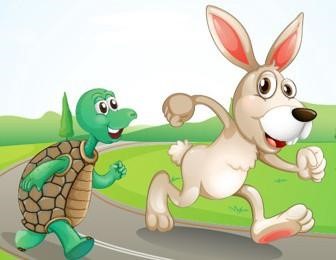Growth and Fixed Mindset: How does your mindset contribute to your achievements?

(Image from https://jnyh.medium.com)
The Rabbit and The Tortoise Story
Have you ever read the rabbit and the tortoise fable?
I think most of us are familiar with this common story.
There once lived a rabbit who was able to run fast, he liked to brag about how fast he could run. Tired of hearing the rabbit’s boast and arrogance, the slow and steady tortoise challenged him to a speed race. Then, all the animals in the forest gathered to watch.
The speed race began, the rabbit ran so fast for a while and then paused to rest. He turned to the tortoise and arrogantly said, “how do you expect to win by walking so slowly?”
Seeing the tortoise’s distance from him, the rabbit lay down in a shady tree and fell asleep.
Slow and steady the tortoise constantly going and running without ever giving up until the finish line. When the tortoise was very close to the finish line, all the animals cheered loudly and woke the sleeping rabbit. Suddenly, the rabbit woke up and started running again, but it was too late. The tortoise has crossed the finish line and won the race.
Children’s fable “the rabbit and turtle” is a perfect example of having a fixed or growth mindset. Instead of believing himself to be slow, the tortoise challenged himself to fight the rabbit.
On the other hand, the rabbit boasts of his abilities and thinks that he will win the race from the slow and steady tortoise. This is what a fixed mindset looks like.
Transferring the story into context, if you were asked do you have a growth mindset or a fixed mindset, what would you say?
Do you look like a tortoise? people who demand improvement despite challenges, or people who are stuck and reluctant to develop abilities like a rabbit?
Growth vs Fixed Mindset
The concept of a growth and fixed mindset was first introduced by Carol Dweck, a Psychologist at Stanford University. This is proposed to understand the effect of people’s belief on their own abilities, which has implications for learning.
People with a fixed mindset believe that their abilities are fixed traits. For example, if you are not good at something, you believe that you will never be good at it – failure is permanent. Besides, people with a growth mindset believe that practice and effort can make their abilities grow and develop over time. It emphasized by Dweck that growth mindset people can understand that their talents and abilities can be developed through effort, good teaching, and persistence.
For instance, a study of 7th grade students who were taught that abilities can be formed and developed with effort and hard work. It found that students with a growth mindset earned scores higher than students with a fixed mindset.
Additionally, people with a growth mindset pay attention to the mistakes made, the next task is to correct those mistakes. Therefore, having a growth mindset can reduce fatigue, depression, anxiety and behavioral problems.
What Should I Do to Cultivate A Growth Mindset?
A study found that teaching a growth mindset to students can change the way they think about achievement and ability with intention and effort. Further, the following are several ways to cultivate a growth mindset.
Reward The Process
Learn to appreciate the process of doing something rather than just focusing on the final result. Whereas, people often reward those who achieve excellent results, this can be against a growth mindset. In his study Dweck showed that rewarded effort can improve performance. For example, in the simple case of wanting to be a debate competition winner. Instead of focusing solely on “debate winner,” appreciate and enjoy the small steps you take each day to reach the goal (i.e. reading books, study groups, gain more insights, and togetherness).
Accept failure as part of the process
It is easy for us to feel disappointed every time we fail at something. There is a famous quote from Michael Jordan (a legendary basketball player) “I’ve missed more than 9000 shots in my career. I’ve lost almost 300 games. 26 times, I’ve been trusted to take the game winning shot and missed. I’ve failed over and over and over again in my life. And that is why I succeed; I can accept failure, everyone fails at something. But I can’t accept not trying.”
Failure is part of the learning process. Imagine if Jordan gave up at his first try, we might never know who he is now. Hence, see failures as a means to improvement rather than a means to an end – live at the process.
Believe in the Benefit of Self-improvement and Learning.
Ultimately, we can change and become better from the mistakes and failures that we made. Through this case we can learn to be better, and reap the salary of our efforts.





Leave a Reply
Want to join the discussion?Feel free to contribute!